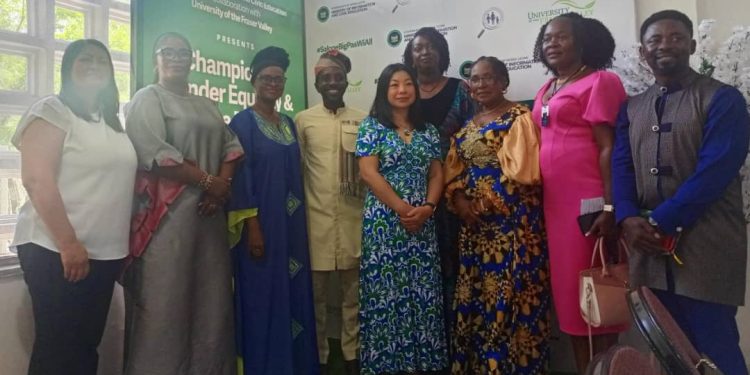By Hassan Osman Kargbo
The Ministry of Information and Civic Education (MoICE), in partnership with the University of the Fraser Valley, Canada, has reaffirmed Sierra Leone’s commitment to promoting gender equality and inclusive education under the powerful theme: “Leave No One Behind; Education is a Right.”
The landmark event, held at the Miatta Conference Hall in Freetown, attracted a wide range of stakeholders, including civil servants, the media, Civil Society Organizations (CSOs), school pupils, persons with disabilities, international partners, ministers, and deputy ministers — all united in their support for advancing gender inclusivity in education and society.
In his opening remarks, the Minister of Information and Civic Education, Hon. Chernor Bah, warmly welcomed the delegation from the University of the Fraser Valley for choosing Sierra Leone as a partner in this transformative agenda.
He reminded the audience that President Dr. Julius Maada Bio himself is a strong advocate of gender equality and has made education for all — especially girls — a central priority of his administration.
Minister Bah shared his personal journey of gender advocacy, noting that his passion for gender issues long preceded his appointment as minister. As a former civil society activist, he worked tirelessly to defend the rights of pregnant girls to remain in school — especially in the aftermath of the Ebola outbreak, which saw thousands of teenage girls forced into early pregnancies.
“The government at that time sought to ban pregnant girls from attending school, but we in civil society refused to accept this injustice,” he recalled. “We fought hard to bring this issue to the forefront and to shape policies that would ensure every girl, regardless of circumstance, could complete her education.”
Minister Bah called on all present — and the wider public — to act as ambassadors for gender equality, spreading the message that inclusive education benefits not only individuals but the nation as a whole.
In her keynote address, Dr. Ramatulai Wurie, Minister of Technical and Higher Education, praised the collaboration between MoICE and the University of the Fraser Valley, emphasizing that Sierra Leone continues to lead the fight for gender equality in the sub-Saharan region.
“Gender equality is not just a slogan; it is a foundation for sustainable development,” she said. “We must go beyond discussions and focus on the practical implementation of policies that address gender-based violence, discrimination, and systemic barriers facing women and girls in education and society at large.”
Dr. Wurie also stressed the importance of changing societal mindsets about gender roles and inclusion, pointing out that people living with disabilities often face additional obstacles in accessing education and employment opportunities. “We must build environments — in schools, workplaces, and government institutions — where no one feels left out because of gender or ability,” she affirmed.
Reaffirming her ministry’s commitment, Dr. Wurie pledged continued support for gender-inclusive programs and policies, noting that true progress requires collective effort and dedication from all sectors of society.
A representative from the University of the Fraser Valley, Catherine Liao, expressed gratitude to the Government of Sierra Leone for its openness and willingness to embrace gender reforms. She underscored that gender equality is not a local issue but a global challenge requiring international cooperation.
“Every nation has a role to play in this journey,” Liao said. “We are proud to partner with Sierra Leone to share knowledge, research, and resources aimed at ensuring that all children — regardless of gender — enjoy their right to quality education.”
In her brief but impactful statement, the Minister of Gender and Children’s Affairs, Dr. Isata Mahoi, emphasized that promoting gender equality is essential for the nation’s socio-economic development. She called for the active involvement of men and boys in gender advocacy, reminding the audience that gender inclusivity benefits everyone — not just women and girls.
“True progress will come when gender equality is seen as a national responsibility, not just a women’s issue,” she noted. “We must create a Sierra Leone where opportunity is not determined by gender but by potential and hard work.”
The event concluded with a unified call for action: for government ministries, civil society, educational institutions, and citizens to work hand in hand in creating an inclusive and just society where no one is left behind.











